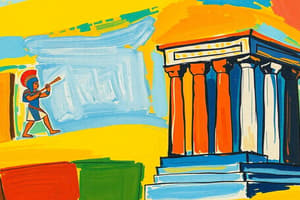Podcast
Questions and Answers
Which ancient civilization is often referred to as the cradle of civilization?
Which ancient civilization is often referred to as the cradle of civilization?
- Egypt
- Rome
- Mesopotamia (correct)
- Greece
Where was Mesopotamia located geographically?
Where was Mesopotamia located geographically?
- Between the Tigris and Euphrates rivers (correct)
- In the Fertile Crescent region
- Along the Nile River
- Near the Mediterranean Sea
Which ancient civilization was known for its hieroglyphic script and pyramids?
Which ancient civilization was known for its hieroglyphic script and pyramids?
- India
- China
- Mesopotamia
- Egypt (correct)
Which ancient civilization contributed to fields like astronomy, law, and literature?
Which ancient civilization contributed to fields like astronomy, law, and literature?
Which ancient civilization had lasting impacts on art, architecture, and religion?
Which ancient civilization had lasting impacts on art, architecture, and religion?
Which ancient civilization is credited with introducing the concept of zero to the world?
Which ancient civilization is credited with introducing the concept of zero to the world?
Which ancient civilization produced vast amounts of knowledge through oral traditions, literature, music, and visual arts?
Which ancient civilization produced vast amounts of knowledge through oral traditions, literature, music, and visual arts?
Which ancient civilization's medical treatments and surgical procedures set standards for centuries?
Which ancient civilization's medical treatments and surgical procedures set standards for centuries?
Which ancient civilization saw the development of democracy, philosophy, drama, and the Olympic Games?
Which ancient civilization saw the development of democracy, philosophy, drama, and the Olympic Games?
Which ancient civilization brought together diverse populations under one rule and left an enduring legacy in infrastructure like roads and aqueducts?
Which ancient civilization brought together diverse populations under one rule and left an enduring legacy in infrastructure like roads and aqueducts?
Flashcards are hidden until you start studying
Study Notes
History: Ancient Civilizations
Ancient civilizations refer to human societies from prehistoric times up until the Middle Ages, which began around the 5th century AD. These early societies played crucial roles in shaping the world's cultures and laid the foundations for modern civilization. Some of the most notable ancient civilizations include Mesopotamia, Egypt, Greece, Rome, China, India, Africa, the Americas, and Europe. Each of these civilizations contributed significantly to human advancement, creating inventions, discoveries, arts, and ideas that continue to influence our lives today.
Mesopotamia
Mesopotamia is often referred to as the cradle of civilization due to its significant contributions during ancient history. Located between the Tigris and Euphrates rivers, it was home to several influential city-states like Ur, Babylon, and Nineveh. Inventors from this region were responsible for numerous innovations such as writing systems (cuneiform), astronomy, and zodiac signs. Additionally, they made important strides in various fields, including law (Code of Hammurabi) and literature (Epic of Gilgamesh).
Egypt
Another ancient civilization with far-reaching influence was Ancient Egypt. Stretching along the Nile River, Egypt was known for its hieroglyphic script, pyramids, mummification practices, obelisks, and temples. Contributions from this society have had lasting impacts on art, architecture, and religion, with many aspects still present today. For instance, Egyptian mathematics has influenced algebra and calculus, while their medical treatments and surgical procedures set standards for centuries.
Greece
Greek civilization emerged around 800 BCE and lasted until 146 BCE when it became part of the Roman Empire. This period saw the development of democracy, philosophy, drama, and the Olympic Games, among other accomplishments. Greek philosophers like Socrates, Plato, and Aristotle laid the groundwork for Western thought, influencing everything from politics to ethics to metaphysics. Similarly, Greek mythology continues to shape modern storytelling through its rich cast of gods and heroes.
Rome
The Roman Republic and later the Roman Empire brought together diverse populations under one rule, leading to cultural fusion. Many Latin expressions are still used in everyday English, reflecting Rome's linguistic impact. Moreover, legal concepts such as habeas corpus originated from Roman law. However, perhaps Rome's most enduring legacy lies in its infrastructure - roads, aqueducts, amphitheaters, and arches are all Roman innovations adopted worldwide.
China
China's contributions to ancient civilizations cannot be overstated. One of the world's oldest continuous civilizations, it developed independently from the Western tradition. Chinese inventions include paper, gunpowder, printing technology, and the compass. Additionally, Confucianism and Daoism, two major philosophies originating in China, continue to shape East Asian culture and beyond.
India
India's ancient civilizations also left indelible marks on humanity. Its earliest known civilization, the Indus Valley Civilization, dates back to around 3300 BCE. India introduced zero to the world, revolutionizing mathematics and science. Furthermore, Hinduism, Buddhism, Jainism, and Sikhism - four major religions originating in India - continue to guide billions globally.
Africa
African civilizations boast a complex history filled with remarkable achievements. From the Great Zimbabwe ruins in southern Africa to the monumental pyramids of Meroë, Sudan, evidence abounds of advanced urban planning, metallurgy, and trade networks across the continent. African societies also produced vast amounts of knowledge through oral traditions, literature, music, and visual arts.
Americas & Europe
The Native American civilizations in North, Central, and South America thrived before European colonizers arrived. They developed agricultural techniques, social structures, and advanced technological skills, which significantly impacted European settlers. Similarly, Europe's ancient civilizations, such as the Celts, Etruscans, and Germans, contributed to modern society through inventions like the four-field farming system.
In conclusion, understanding ancient civilizations is crucial for comprehending our past and present. Their discoveries, innovations, and cultural legacies continue to shape our lives today. From the pyramids of Egypt to the philosophies of Greece, these societies laid the groundwork for modern civilization.
Studying That Suits You
Use AI to generate personalized quizzes and flashcards to suit your learning preferences.




